What Happens If Autism Is Not Treated?

The Critical Need for Early Diagnosis and Treatment
Autism Spectrum Disorder (ASD) is a lifelong neurological difference affecting how individuals communicate, socialize, and process their environment. While it cannot be cured, early diagnosis and intervention play a vital role in improving outcomes. When autism remains untreated, individuals face significant developmental, social, and health-related challenges that impact their quality of life throughout life stages. This article explores the profound effects of neglecting autism treatment, emphasizing why timely intervention is essential for fostering better long-term results.
Why Early Diagnosis and Intervention Are Crucial
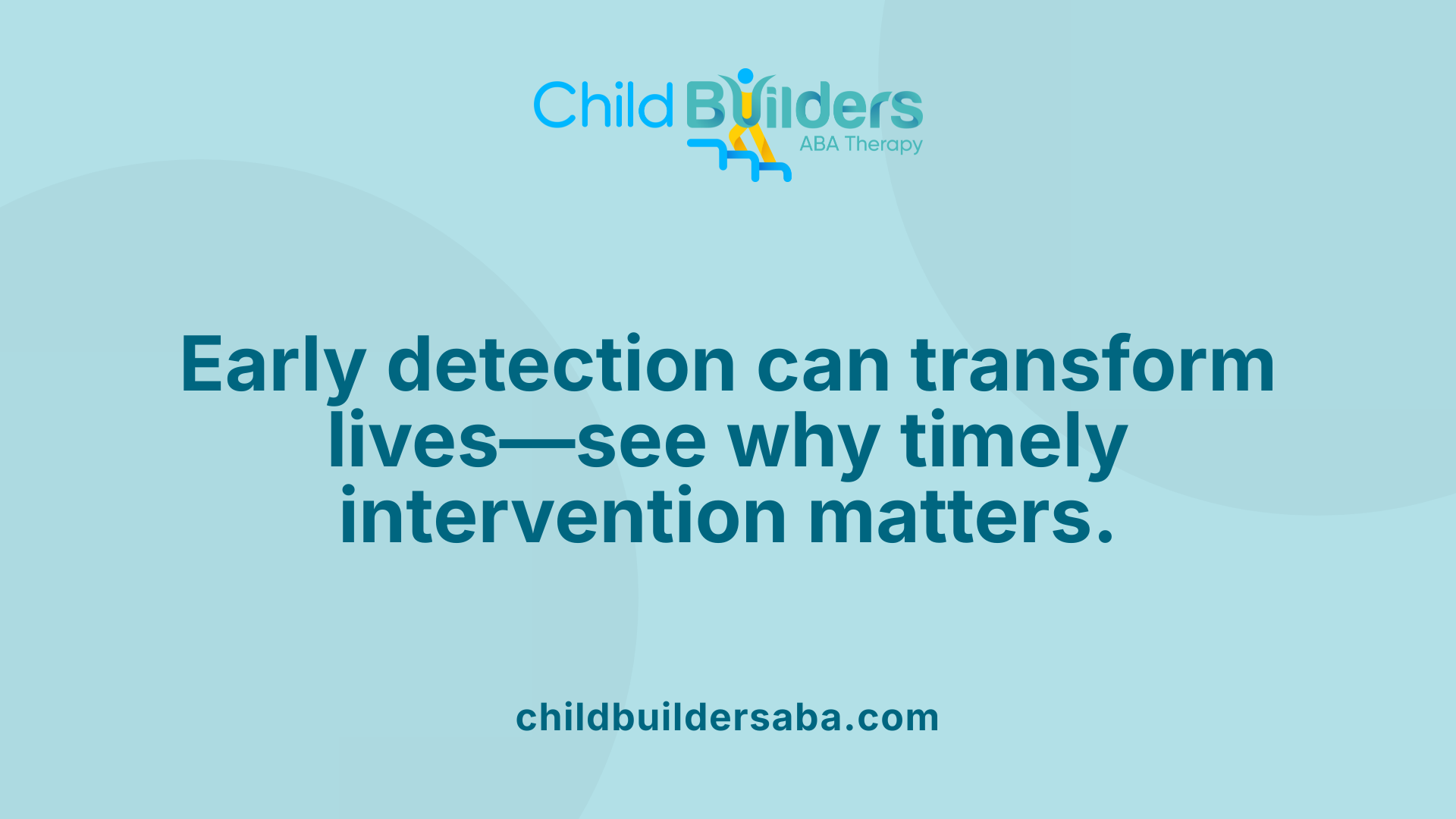
Why is early diagnosis and intervention important for autism spectrum disorder?
Identifying autism early is vital to helping children reach their full potential. When signs of autism are detected around ages 2 or even earlier, children can start receiving targeted therapies that support their development from a young age.
Early support can include speech and language therapy, occupational therapy, and behavioral interventions such as Applied Behavior Analysis (ABA). These approaches are most effective when begun during the brain's critical growth periods, taking advantage of neuroplasticity—the brain's ability to adapt and change.
Implementing interventions early can significantly improve communication skills, social interactions, and emotional regulation. This reduces feelings of frustration and can help prevent behavioral issues from becoming more severe.
Furthermore, early intervention has been shown to increase the chances of children gaining independence and performing better academically. It also improves overall quality of life by fostering social skills and reducing anxiety.
In summary, diagnosing autism early enables access to supports that can shape a more positive development trajectory, ultimately helping children build essential skills to navigate the world confidently.
Long-Term Outcomes of Untreated Autism
What is the overall impact of untreated autism on an individual's cognitive, social, and emotional development?
Individuals with untreated autism often face continuous challenges that affect multiple aspects of their lives. Cognitive development may be hindered by persistent communication difficulties and behavioral issues, making it harder to acquire and apply new skills.
Socially, untreated autism can lead to significant difficulties in understanding social cues, establishing friendships, and engaging in typical social interactions. Children and adults may struggle with forming meaningful relationships, which can result in feelings of loneliness and social isolation.
Emotionally, those without intervention may experience poor emotional regulation, leading to frequent frustration, anxiety, and depression. This emotional dysregulation can escalate into behavioral problems such as aggression or self-injury, making daily life more complicated.
Overall, the absence of early diagnosis and appropriate support tends to reduce the person's quality of life. They may encounter barriers to education and employment, and face increased risks of developing mental health issues like depression and suicidal thoughts.
Furthermore, without intervention, challenges in independence and adaptive skills can become more severe, affecting long-term stability and well-being. The combination of social, emotional, and developmental struggles underscores the importance of early support to improve life outcomes for individuals with autism.
The Role of Treatment and Therapy in Managing Autism
What are the role and benefits of various autism treatments and therapies?
Treatments and therapies for autism aim to help individuals develop essential skills, improve communication, enhance social interactions, and manage challenging behaviors. These interventions are vital in improving everyday functioning and quality of life.
One widely practiced approach is Applied Behavior Analysis (ABA). ABA is a structured, evidence-based therapy that modifies behaviors through reinforcement strategies. It is especially effective when introduced early, as it leverages neuroplasticity during childhood.
Developmental therapies like speech therapy and occupational therapy support language skills, sensory processing, motor development, and daily living abilities. Speech therapy helps improve communication, while occupational therapy assists with sensory sensitivities and motor coordination.
Educational strategies such as the TEACCH approach utilize visual aids and routines to enhance learning. Social-relational therapies, including social skills groups and programs like DIR or 'Floor Time,' work to improve social understanding and relationships.
Pharmacological treatments are also important for managing co-occurring symptoms like anxiety, hyperactivity, seizures, or gastrointestinal issues. These medications are used alongside behavioral therapies to provide comprehensive support.
Implementing a personalized treatment plan early on involves collaboration among healthcare providers, families, and educators. Such tailored interventions lead to better developmental outcomes, helping individuals with autism reach their full potential across various life domains.
Long-Term Developmental Challenges from Untreated Autism
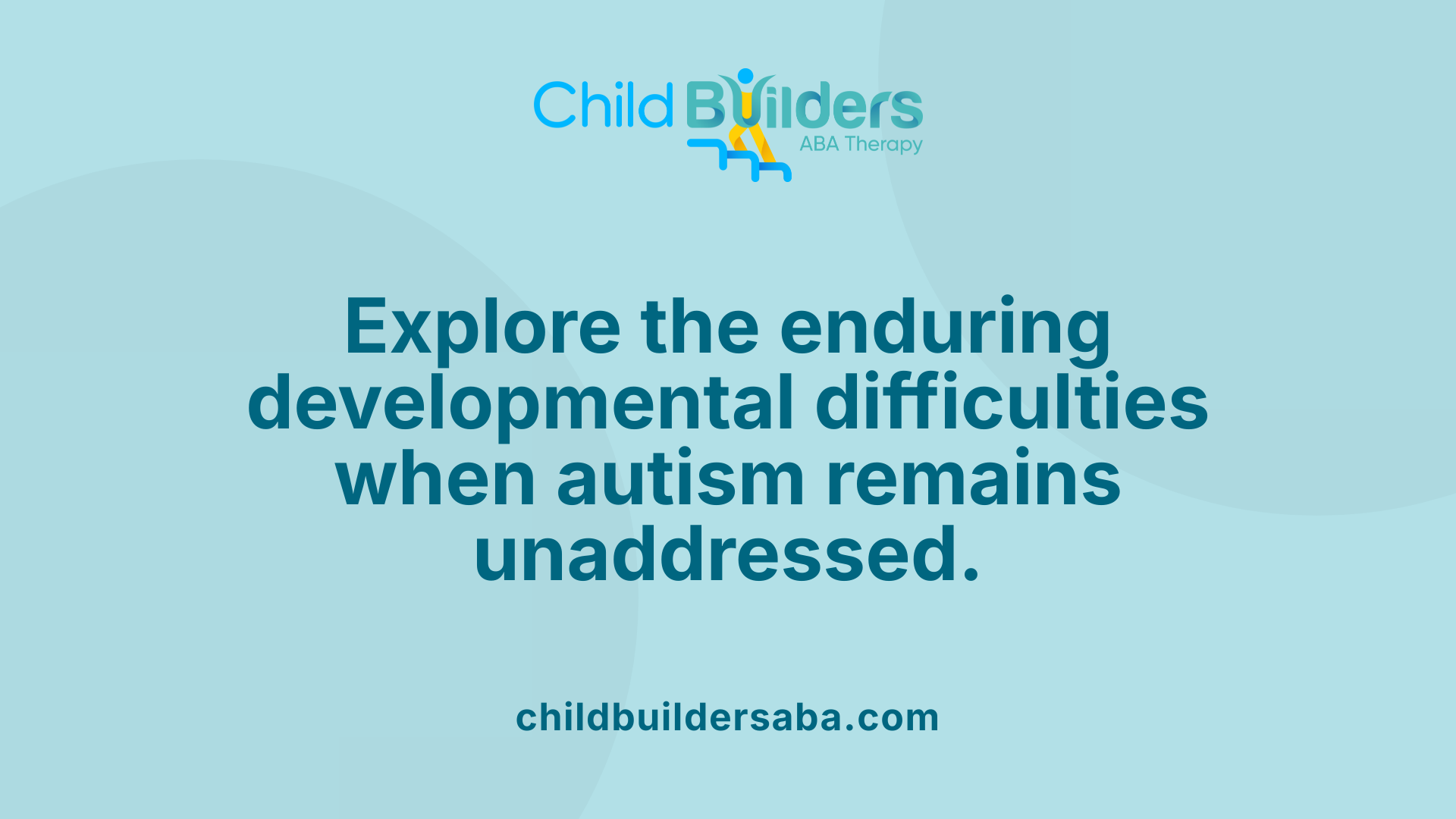
What are the potential long-term developmental challenges resulting from untreated autism?
If autism remains unaddressed, individuals often face enduring difficulties in social, communication, and everyday adaptive skills. These persistent challenges can greatly reduce their quality of life, affecting both personal and professional realms.
Many adults with untreated autism struggle with establishing and maintaining relationships due to ongoing social interaction and communication barriers. They may find it hard to interpret social cues, read facial expressions, or respond appropriately, leading to social isolation.
Mental health issues are common among those without early intervention. Anxiety and depression frequently develop as individuals experience frustration or difficulty navigating social environments. Low self-esteem and feelings of loneliness can intensify these problems.
In addition, behavioral challenges such as repetitive routines or sensory sensitivities may worsen over time. These difficulties can cause safety concerns, especially when impulsivity or emotional regulation issues are not managed.
Long-term impacts include reduced independence and employment prospects. Many adults with untreated autism face challenges in securing stable jobs, managing daily tasks, or living independently, which may lead to increased reliance on caregivers.
Social isolation can be profound, making it harder for individuals to access community resources or support networks. They may also be more vulnerable to exploitation or burnout due to heightened stress and limited coping skills.
Outcomes vary considerably depending on severity, support systems, and intervention opportunities. Some individuals may achieve a certain degree of autonomy with supports in place, while others continue to require substantial assistance.
Early diagnosis and tailored interventions are vital to mitigate these long-term issues. Support strategies such as behavioral therapies, social skills training, and mental health care can foster improved functioning and better overall life satisfaction.
Risks and Adverse Outcomes from No Treatment
What are the risks and adverse outcomes associated with lack of autism treatment?
When autism is left untreated, individuals often face ongoing challenges that impact many aspects of their lives. Social, communication, and behavioral difficulties tend to persist or even worsen. These difficulties can make it hard for individuals to form relationships, maintain friendships, or succeed in educational settings and the workforce.
Without intervention, the risk of developing mental health problems increases significantly. Anxiety, depression, and emotional distress are common, often stemming from social isolation or frustrations related to communication struggles. These mental health issues may further impair life satisfaction and overall wellbeing.
Physical health concerns are also more likely in untreated autism. Many individuals experience comorbidities such as gastrointestinal disorders, sleep disturbances, and seizures. These health problems can exacerbate challenges and reduce quality of life.
Safety is another concern. Without proper support, autistic individuals may be more vulnerable to abuse, neglect, and exploitation. This risk extends into adulthood, where difficulties with independence and self-care may limit their ability to live safely and autonomously.
Ultimately, the absence of tailored interventions can lead to a cycle of increasing difficulties—hindering personal growth, reducing social integration, and diminishing the potential for leading a fulfilling life. Early treatment and support are crucial in mitigating these risks and promoting better long-term outcomes.
Societal and Behavioral Challenges of Untreated Autism
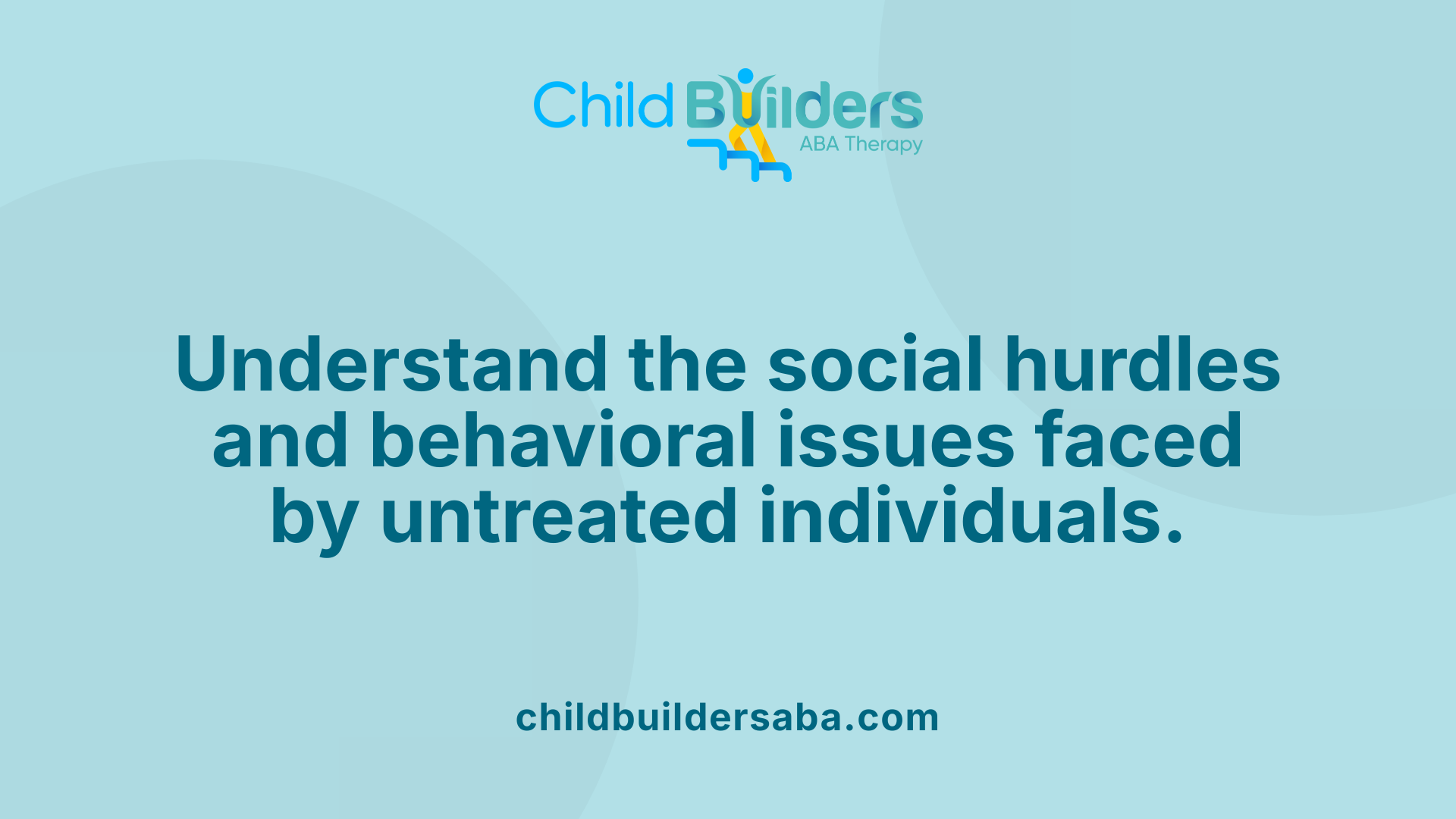
What are the societal and behavioral difficulties faced by individuals with untreated autism?
Untreated autism can lead to a range of societal and behavioral challenges that impact everyday life. Individuals may struggle to understand social cues, which are essential for effective communication and forming relationships. This difficulty often results in social isolation, as they may find it hard to connect with peers, participate in group activities, or maintain friendships.
Behaviorally, children and adults with untreated autism may exhibit repetitive actions or stereotypies such as hand-flapping, rocking, or repeating phrases. These behaviors can become sources of concern or misunderstanding for others and may increase in frequency if not addressed. Furthermore, some individuals may display aggressive behaviors or self-injury as responses to sensory overload, frustration, or anxiety.
These challenges extend into social participation and employment. Difficulties with communication and understanding social norms can lead to difficulties in job settings, reducing employment opportunities and job stability. Maintaining social relationships can also be difficult, leading to feelings of loneliness or exclusion.
The absence of early diagnosis and intervention exacerbates these issues, often resulting in heightened anxiety, depression, and even thoughts of self-harm or suicidality. Additionally, rigid routines and intense interests characteristic of autism can limit flexible thinking and adaptability, complicating participation in community activities.
Overall, untreated autism can significantly diminish quality of life by affecting mental health, independence, and social integration. This underscores the importance of early detection and support to help individuals develop skills that foster social engagement and better manage behavioral challenges.
| Aspect | Impact | Additional Details |
|---|---|---|
| Social understanding | Difficulties in interpreting social cues, leading to isolation | Affects friendships and community participation |
| Behavioral issues | Repetitive behaviors, aggression, self-injury | Often worsen without behavioral support |
| Employment challenges | Reduced job opportunities and stability | Social and communication difficulties play a role |
| Emotional health | Increased risk of anxiety, depression, suicidal thoughts | Often linked to social struggles and behavioral problems |
| Community involvement | Limited participation, social exclusion | Due to rigidity and sensory sensitivities |
Supporting early diagnosis and intervention can help individuals develop social skills, reduce problematic behaviors, and improve overall life quality. Community and educational programs tailored for autism are vital in fostering inclusion and independence.
Impact on Adult Functioning and Life Quality
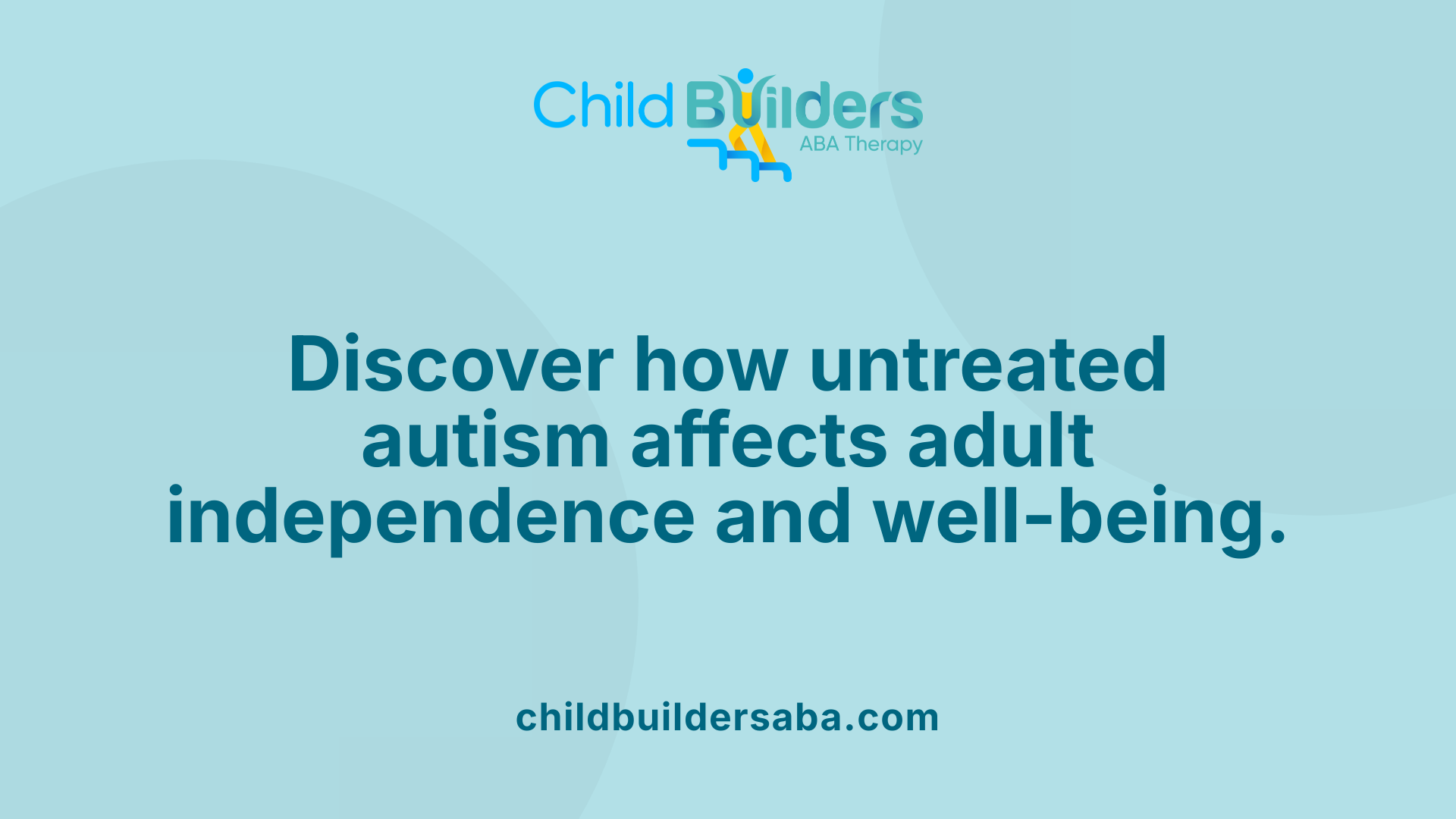
How does untreated autism affect an individual's functioning and quality of life in adulthood?
Untreated autism in adults can have profound effects on various aspects of daily living. Social interactions often become strained, leading to social isolation and difficulty forming or maintaining relationships. Adults with undiagnosed autism may struggle with communication skills, which can interfere with personal, social, and professional relationships.
Mental health issues are common among adults without appropriate support. Conditions such as depression, anxiety, and low self-esteem frequently result from ongoing challenges with emotional regulation and social understanding. These mental health concerns can further hinder an adult's ability to engage in work or community activities.
Safety and independence are also affected. Many adults with untreated autism may find it challenging to recognize social cues related to safety, increasing the risk of exploitation or hazardous situations. Their ability to live independently might be compromised due to difficulties with daily tasks, decision-making, or managing sensory sensitivities.
Early diagnosis and intervention play crucial roles in altering these outcomes. When autism is identified early, support services and therapies can develop skills that promote greater independence and social integration. This can lead to improved employment opportunities, better mental health, and a higher quality of life, helping adults navigate life with confidence and stability.
Understanding the lifelong impact of untreated autism underscores the importance of screening and providing appropriate resources across the lifespan, ensuring individuals can achieve their full potential.
Consequences of Undiagnosed Autism in Adults
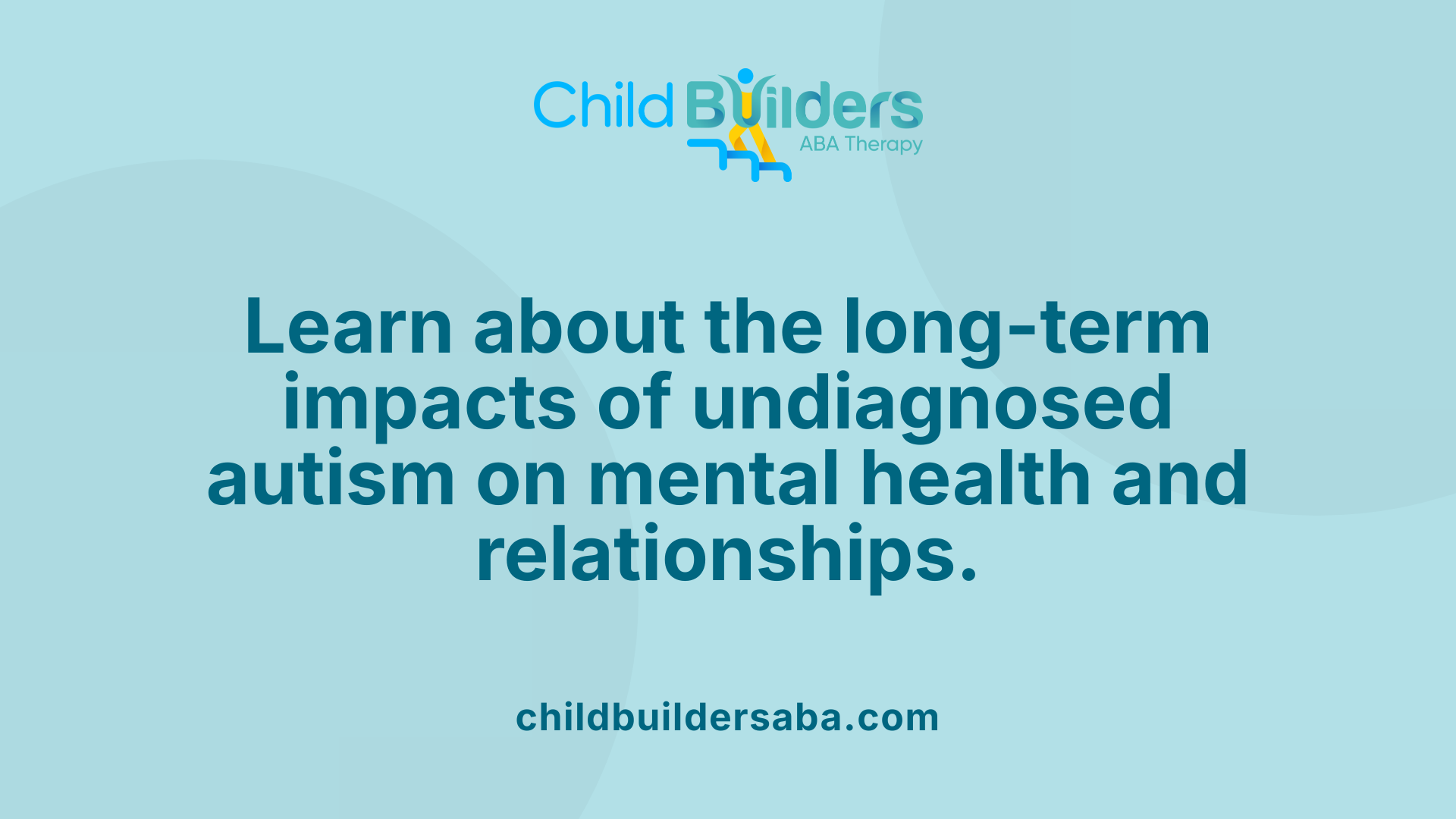
What are the consequences of undiagnosed autism in adults?
When autism goes undiagnosed in adults, it can lead to serious mental health and social challenges. Many adults may experience heightened levels of anxiety and depression, often feeling overwhelmed by everyday social interactions and their own emotional responses. This can cause low self-esteem and feelings of isolation, as they might find it difficult to connect with others or to understand social norms.
Undiagnosed autism also impacts relationships. Adults may struggle to form and maintain friendships or romantic partnerships because of communication difficulties and sensory sensitivities. Feeling misunderstood can lead to frustration and internalized feelings of failure.
Practical issues are common in the workplace. Without awareness of their condition, autistic adults might find it hard to navigate social nuances, manage sensory overloads, and adhere to routines. This can result in challenges with job stability, lower income, and limited career advancement.
Safety and vulnerability are additional concerns. Adults who are unaware of their autism may be more susceptible to exploitation or abuse because they lack knowledge of social red flags and appropriate boundaries.
Not having a diagnosis prevents access to specialized support, accommodations, and therapies that could greatly enhance daily functioning. Recognizing autism in adulthood allows individuals to seek help, improve their quality of life, and develop strategies for managing their unique strengths and challenges.
In summary, undiagnosed autism can lead to persistent mental health issues, strained relationships, employment struggles, and increased safety risks. Early diagnosis and intervention are vital to provide the necessary support for a more fulfilling and safer adult life.
The Power of Early Detection and Support
Recognizing autism early and providing access to targeted therapies and supports can dramatically alter life trajectories, unlocking potential and fostering independence. Untreated autism, conversely, often results in lifelong difficulties spanning social, emotional, and health domains, underscoring the importance of early diagnosis. While autism is a lifelong condition, the difference that appropriate treatment and community support can make is profound, helping individuals lead fulfilling lives, integrate socially, and reach their fullest potential.
References
- Autism Spectrum Disorder (ASD) Symptoms & Causes
- Untreated Autism: What Are the Reasons to Utilize Therapy?
- Long-term outcome of autism spectrum disorder - PMC
- Medical conditions associated with autism | Autism Speaks
- Signs of Undiagnosed Autism in Adults
- Treatment and Intervention for Autism Spectrum Disorder - CDC
- Risks Associated With Undiagnosed ADHD and/or Autism

























.jpg)











































































